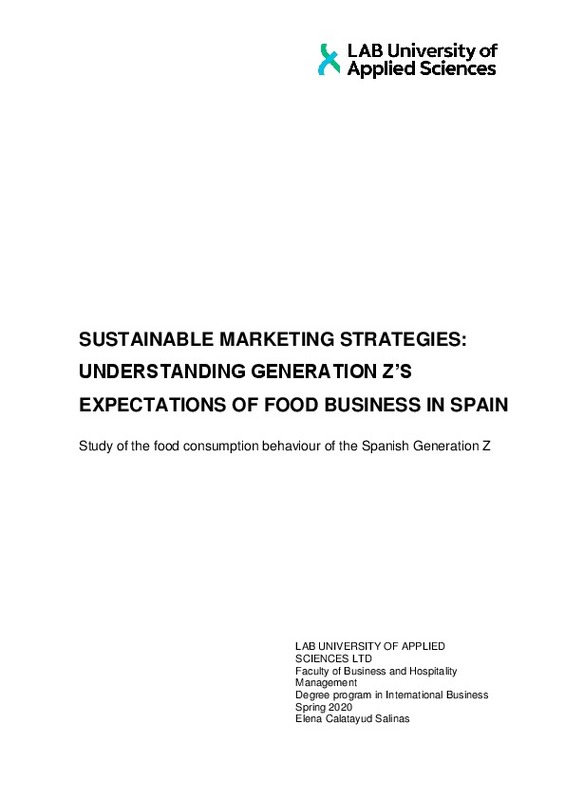JavaScript is disabled for your browser. Some features of this site may not work without it.
Buscar en RiuNet
Listar
Mi cuenta
Estadísticas
Ayuda RiuNet
Admin. UPV
Sustainable marketing strategies: Understanding Generation Z’s expectations of food business in Spain
Mostrar el registro sencillo del ítem
Ficheros en el ítem
| dc.contributor.advisor | García Bernabeu, Ana María
|
es_ES |
| dc.contributor.advisor | Viljanen, Marja Elina
|
es_ES |
| dc.contributor.advisor | Guedra, Hamid
|
es_ES |
| dc.contributor.author | Calatayud Salinas, Elena
|
es_ES |
| dc.date.accessioned | 2021-03-08T12:54:54Z | |
| dc.date.available | 2021-03-08T12:54:54Z | |
| dc.date.created | 2020-02-23 | |
| dc.date.issued | 2021-03-08 | es_ES |
| dc.identifier.uri | http://hdl.handle.net/10251/163331 | |
| dc.description.abstract | [ES] El caso, para este estudio, es descubrir el modo de vida y la tendencia de consumo que sigue el grupo de edad de la Generación Z, más concretamente, este estudio se concentra en los alimentos que demandan, teniendo en cuenta su compromiso con el medio ambiente y su estilo de vida sostenible. Estudiar las razones que les han llevado a tomar este camino, observar cómo es el mercado de los alimentos que demandan y enumerar las diferentes acciones de marketing que se pueden llevar a cabo para acceder a ellos | es_ES |
| dc.description.abstract | [EN] This study aims to discover the consumption trends of the part of Generation Z that follows a sustainable diet with respect to food. The final aim of the thesis is to help food companies to better understand generation Z’s food consumption habits to attract the target group by creating sustainable marketing strategies. Theoretical information was collected with secondary data on who the customer is and their behaviour and how to base marketing actions on this, as well as knowing what sustainable marketing is, corporate social responsibility and what it means and what it implies to follow a sustainable diet. The primary data was collected through a survey with closed questions and open questions as an interview that was sent to the Generation Z members who met the sustainable diet monitoring requirements chosen to be the study sample. After the sur-vey, the results were analysed using a quantitative method for closed-ended single and multiple response questions and a qualitative method for open-ended interview questions. The main results answered the main research questions. The first was trends in food consumption were changing, the second was sustainable diets were mainly based on reducing negative impact on the environment. The sustainable marketing strategies that food companies were recommended to use were closely linked to what customers consider when they buy, so the following was recommended: obtaining food products from responsible and environmentally friendly sources, taking care of workers, showing through promotion the characteristics of products and benefits of this type of diet, distributing products in traditional markets, local specialized stores or supermarkets, reducing product packaging and using less environmentally harmful materials such as biodegradable plastics, reducing prices and recycling and reusing packaging through return stations. | es_ES |
| dc.format.extent | 71 | es_ES |
| dc.language | Inglés | es_ES |
| dc.publisher | Universitat Politècnica de València | es_ES |
| dc.rights | Reserva de todos los derechos | es_ES |
| dc.subject | Generación-Z | es_ES |
| dc.subject | Hábitos de consumo | es_ES |
| dc.subject | Responsabilidad Social Corporativa (RSC) | es_ES |
| dc.subject | Sostenibilidad | es_ES |
| dc.subject | Generation-Z | es_ES |
| dc.subject | Consum Habits | es_ES |
| dc.subject | Corporate Social Responsibility (CSR) | es_ES |
| dc.subject | Sustainability | es_ES |
| dc.subject.classification | ECONOMIA APLICADA | es_ES |
| dc.subject.other | Grado en Administración y Dirección de Empresas-Grau en Administració i Direcció d'Empreses | es_ES |
| dc.title | Sustainable marketing strategies: Understanding Generation Z’s expectations of food business in Spain | es_ES |
| dc.title.alternative | Estrategias de comercialización sostenibles: Crear valor empresarial mediante la comprensión de las expectativas de la Generación Z en el negocio de la alimentación en España | es_ES |
| dc.type | Proyecto/Trabajo fin de carrera/grado | es_ES |
| dc.rights.accessRights | Abierto | es_ES |
| dc.contributor.affiliation | Universitat Politècnica de València. Escuela Politécnica Superior de Alcoy - Escola Politècnica Superior d'Alcoi | es_ES |
| dc.contributor.affiliation | Universitat Politècnica de València. Departamento de Economía y Ciencias Sociales - Departament d'Economia i Ciències Socials | es_ES |
| dc.description.bibliographicCitation | Calatayud Salinas, E. (2020). Sustainable marketing strategies: Understanding Generation Z’s expectations of food business in Spain. Universitat Politècnica de València. http://hdl.handle.net/10251/163331 | es_ES |
| dc.description.accrualMethod | TFGM | es_ES |
| dc.relation.pasarela | TFGM\127711 | es_ES |
Este ítem aparece en la(s) siguiente(s) colección(ones)
-
EPSA - Trabajos académicos [5826]
Escuela Politécnica Superior de Alcoy






